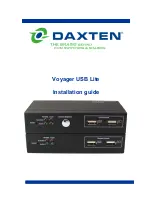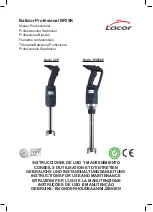
Cable Requirements
Cables to connect the Voyager Local unit to your PC’s system unit are supplied in the package. Your
Monitor and USB devices will plug straight in to the Voyager Remote Unit. The Voyager USB Lite is a
dual access unit, in that it allows for an access point (monitor) next to your computer as well as access
point up to 200m away.
The UTP / STP interconnect cable to connect the Voyager Local Unit to the Voyager Remote Unit is
not supplied with the Voyager units. If you do not have suitable CAT 5, 5E or 6 UTP or STP cable
fitted at you site, please consult your dealer.
The Local and Remote Units are connected by industry standard structured cabling (Category 5, 5E or
6 UTP/STP, 4-pair) terminated with RJ45 connectors.
The cable used should be solid trunk cable. Stranded patch cable will give poor results over longer
distances.
CAT5 Wiring Scheme
The Local-Remote interconnection cable is terminated in RJ45 connectors and should be wired
according to the EIA/TIA 568 (Scheme B preferred) industry standard. The Voyager will function with
other wiring schemes, but the video quality may be impaired.
Orientation: Looking into the RJ45 socket pin 1 is on the left and pin 8 on the right.
Pin Wire Colour
Wire Pair
1
White/Orange
T2
2
2
Orange/White
R2
2
3
White/Green
T3
3
4
Blue/White
R1
1
5
White/Blue
T1
1
6
Green/White
R3
3
7
White/Brown
T4
4
8
Brown/White
R4
4
The Voyager has been tested with all major makes of CAT 5 cable including BICC-VERO, Mohawk,
and Brand-Rex. The Voyager has also been tested with most major makes of CAT 5E and CAT6 with
good results.
This Voyager USB Lite extender is designed for use up to a maximum cable length of 200mt. At this
length the video quality should still be acceptable even at a screen resolution of 1280 x 1024 (60 Hz).
Although a single continuous length of interconnect cable is preferable, operation is possible through
multiple Patch Panels. However, the more patch panels the cable is routed through, the greater the
chance of video signal degradation.
The connector wiring must meet the EIA/TIA 568 standard.
Note:
That failure to wire the twisted pairs correctly will impair the video quality
dramatically and / or prevent correct operation
.



























